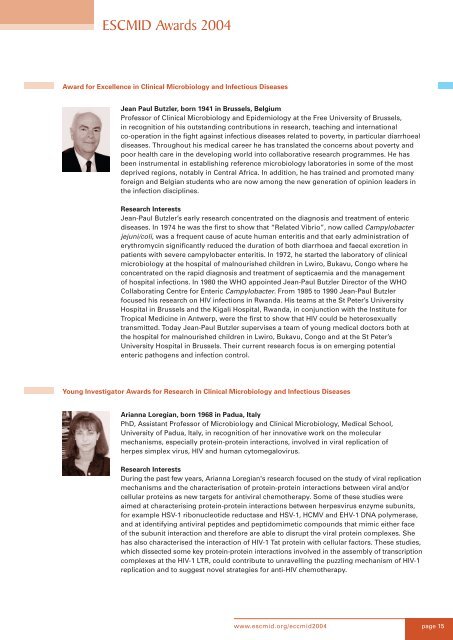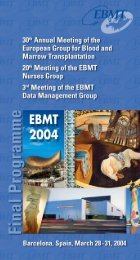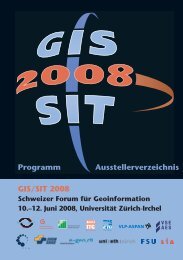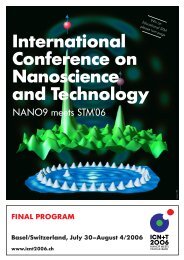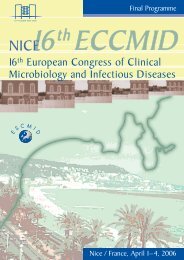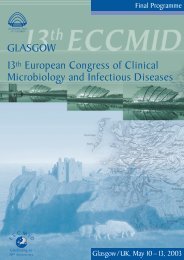14th European Congress of Clinical Microbiology and Infectious ...
14th European Congress of Clinical Microbiology and Infectious ...
14th European Congress of Clinical Microbiology and Infectious ...
You also want an ePaper? Increase the reach of your titles
YUMPU automatically turns print PDFs into web optimized ePapers that Google loves.
ESCMID Awards 2004<br />
Award for Excellence in <strong>Clinical</strong> <strong>Microbiology</strong> <strong>and</strong> <strong>Infectious</strong> Diseases<br />
Jean Paul Butzler, born 1941 in Brussels, Belgium<br />
Pr<strong>of</strong>essor <strong>of</strong> <strong>Clinical</strong> <strong>Microbiology</strong> <strong>and</strong> Epidemiology at the Free University <strong>of</strong> Brussels,<br />
in recognition <strong>of</strong> his outst<strong>and</strong>ing contributions in research, teaching <strong>and</strong> international<br />
co-operation in the fight against infectious diseases related to poverty, in particular diarrhoeal<br />
diseases. Throughout his medical career he has translated the concerns about poverty <strong>and</strong><br />
poor health care in the developing world into collaborative research programmes. He has<br />
been instrumental in establishing reference microbiology laboratories in some <strong>of</strong> the most<br />
deprived regions, notably in Central Africa. In addition, he has trained <strong>and</strong> promoted many<br />
foreign <strong>and</strong> Belgian students who are now among the new generation <strong>of</strong> opinion leaders in<br />
the infection disciplines.<br />
Research Interests<br />
Jean-Paul Butzler’s early research concentrated on the diagnosis <strong>and</strong> treatment <strong>of</strong> enteric<br />
diseases. In 1974 he was the first to show that “Related Vibrio”, now called Campylobacter<br />
jejuni/coli, was a frequent cause <strong>of</strong> acute human enteritis <strong>and</strong> that early administration <strong>of</strong><br />
erythromycin significantly reduced the duration <strong>of</strong> both diarrhoea <strong>and</strong> faecal excretion in<br />
patients with severe campylobacter enteritis. In 1972, he started the laboratory <strong>of</strong> clinical<br />
microbiology at the hospital <strong>of</strong> malnourished children in Lwiro, Bukavu, Congo where he<br />
concentrated on the rapid diagnosis <strong>and</strong> treatment <strong>of</strong> septicaemia <strong>and</strong> the management<br />
<strong>of</strong> hospital infections. In 1980 the WHO appointed Jean-Paul Butzler Director <strong>of</strong> the WHO<br />
Collaborating Centre for Enteric Campylobacter. From 1985 to 1990 Jean-Paul Butzler<br />
focused his research on HIV infections in Rw<strong>and</strong>a. His teams at the St Peter’s University<br />
Hospital in Brussels <strong>and</strong> the Kigali Hospital, Rw<strong>and</strong>a, in conjunction with the Institute for<br />
Tropical Medicine in Antwerp, were the first to show that HIV could be heterosexually<br />
transmitted. Today Jean-Paul Butzler supervises a team <strong>of</strong> young medical doctors both at<br />
the hospital for malnourished children in Lwiro, Bukavu, Congo <strong>and</strong> at the St Peter’s<br />
University Hospital in Brussels. Their current research focus is on emerging potential<br />
enteric pathogens <strong>and</strong> infection control.<br />
Young Investigator Awards for Research in <strong>Clinical</strong> <strong>Microbiology</strong> <strong>and</strong> <strong>Infectious</strong> Diseases<br />
Arianna Loregian, born 1968 in Padua, Italy<br />
PhD, Assistant Pr<strong>of</strong>essor <strong>of</strong> <strong>Microbiology</strong> <strong>and</strong> <strong>Clinical</strong> <strong>Microbiology</strong>, Medical School,<br />
University <strong>of</strong> Padua, Italy, in recognition <strong>of</strong> her innovative work on the molecular<br />
mechanisms, especially protein-protein interactions, involved in viral replication <strong>of</strong><br />
herpes simplex virus, HIV <strong>and</strong> human cytomegalovirus.<br />
Research Interests<br />
During the past few years, Arianna Loregian's research focused on the study <strong>of</strong> viral replication<br />
mechanisms <strong>and</strong> the characterisation <strong>of</strong> protein-protein interactions between viral <strong>and</strong>/or<br />
cellular proteins as new targets for antiviral chemotherapy. Some <strong>of</strong> these studies were<br />
aimed at characterising protein-protein interactions between herpesvirus enzyme subunits,<br />
for example HSV-1 ribonucleotide reductase <strong>and</strong> HSV-1, HCMV <strong>and</strong> EHV-1 DNA polymerase,<br />
<strong>and</strong> at identifying antiviral peptides <strong>and</strong> peptidomimetic compounds that mimic either face<br />
<strong>of</strong> the subunit interaction <strong>and</strong> therefore are able to disrupt the viral protein complexes. She<br />
has also characterised the interaction <strong>of</strong> HIV-1 Tat protein with cellular factors. These studies,<br />
which dissected some key protein-protein interactions involved in the assembly <strong>of</strong> transcription<br />
complexes at the HIV-1 LTR, could contribute to unravelling the puzzling mechanism <strong>of</strong> HIV-1<br />
replication <strong>and</strong> to suggest novel strategies for anti-HIV chemotherapy.<br />
www.escmid.org/eccmid2004<br />
page 15


